State Representatives Reaffirm Support for Political Solution and Reject Normalization

October 16, 2024
Representatives of countries concerned with the Syrian cause reaffirmed their support for a political solution based on UN Security Council Resolution 2254. They welcomed the involvement of the Syrian Negotiation Commission in recent Security Council sessions and emphasized the need for clear mechanisms to monitor and protect Syrian refugees, particularly those returning from Syria or stranded in Lebanon.
During a meeting held today at the Negotiation Commission’s office, Dr. Badr Jamous, President of the Syrian Negotiation Commission, and several Commission members met with numerous international envoys, diplomats, and European politicians. The diplomats reiterated their commitment to the implementation of Resolution 2254 and expressed their readiness to support any Security Council initiatives that advance this process. They also voiced strong support for the work of the Commission and praised the ongoing dialogue.
The representatives highlighted the worsening situation in the region, emphasizing the need for collective efforts to push forward a political solution in Syria and to implement Resolution 2254. They underlined the importance of a credible political process and called on the Syrian Negotiation Commission to play a vital role in this effort as the political representative of the Syrian opposition.
While acknowledging their countries’ humanitarian efforts, the diplomats stressed that aid alone is not enough. They called for the Security Council to take concrete steps to implement Resolution 2254 and urged the resumption of the Syrian Constitutional Committee meetings, exclusively in Geneva.
The representatives also expressed deep concern over the safety of Syrian refugees returning from Lebanon. They raised questions about the guarantees mentioned by the UN High Commissioner for Refugees after his recent visit to Syria and warned of potential risks for returnees. They stressed the need for pressure on the Syrian regime to meet specific conditions, reaffirming their opposition to normalization with the regime without concrete progress toward a political solution.
Dr. Jamous and Commission members provided a comprehensive update on the political process and the Commission’s ongoing efforts to advance it. They also raised concerns over the deteriorating situation for Syrian refugees in Lebanon and the risks faced by those returning to Syria. Additionally, the Commission highlighted its efforts to establish a global Syrian lobbying network to increase international pressure on the Syrian regime.
The meeting concluded with a call for coordinated international efforts to push the political process forward, ensure the protection of Syrian refugees, and hold the Syrian regime accountable to international commitments.
